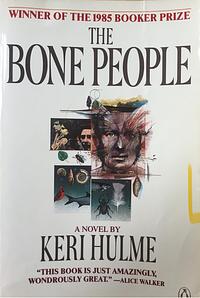You need to sign in or sign up before continuing.
Take a photo of a barcode or cover
This book left me reeling. I never thought I'd feel conflicted about child abuse and whether victims of child abuse should be removed from their abusers. And yet this book manages to paint a world wherein that question is asked.
I originally picked it up looking for a good book about New Zealand and its culture. Instead, I'm asking questions about what it means to be family, what it means to love, to belong to someone or a group, or a place, and what it means to hate the ones you love.
Beautifully, lyrically, and confusingly written, I love this book and its characters. I probably won't read it again any time soon because parts of it are just painful to read. Images painted in my mind from the world the author created won't fade any time soon.
I originally picked it up looking for a good book about New Zealand and its culture. Instead, I'm asking questions about what it means to be family, what it means to love, to belong to someone or a group, or a place, and what it means to hate the ones you love.
Beautifully, lyrically, and confusingly written, I love this book and its characters. I probably won't read it again any time soon because parts of it are just painful to read. Images painted in my mind from the world the author created won't fade any time soon.
I haven't been able to re-read this, though I have tried several times. But when I read it back in the 80s I found myself literally gasping and choking on tears at 2:00 in the morning.
It's been 9 months and I still don't know what to think of this novel. It is deftly written with an unmistakable voice and culture. At times touching and at other times heartbreakingly bleak it is an unflinching look at complex topics and includes a rare character in an aromantic, asexual woman.
Very confusing writing style. Hard to make sense of in many places, but if you like to read about child abuse, alcoholism, and dysfunctional relationships, with a dose of Māori culture and an odd bit of magic, you may enjoy it.
I liked this book a lot but I might be biased because I went to NZ about 6 months ago. Unlike those who wanted it shorter, I would have liked a little more, for example spelling out of the details in the ending. But I liked it regardless.
This was a tough book to read for myriad reasons. I truly hated the font style and paper color. It gave me a headache the first few reading sessions. It also uses a very unique writing style that took me a really long time to get a grasp on. Lastly, the content, once I got into the narrative and was able to read at a pretty good clip, was brutal and violent and very sad. This book just made me sad. It hurt my heart. Sometimes books hurt my heart in a way I like. Not so with this one. It just bummed me out.
I read Bone People as part of our reading group's commitment to working through the Booker prize list (plus it was inevitable being a famous Kiwi publication)
The book began pretty smoothly for me, a challenging protagonist, a compelling vulnerable child and an unknown quantity in the child's father.
Its no secret that the story delves into abuse, but the direction of Bone people is confronting to say the least. Nonetheless the original and in my opinion close to real take is something that will not be seen elsewhere.
In regards to other aspects of the book, I found the narrative hard to follow much of the time. I enjoyed the sporadic leaps into clarity especially during harrowing scenes, although I often found myself questioning whose head I was in (this of course maybe a criticism of my own attentional abilities, just putting it out there) This in total left me feeling a little unsatisfied by the end of the book, however glad I was to have jumped in Hulme's world.
The book began pretty smoothly for me, a challenging protagonist, a compelling vulnerable child and an unknown quantity in the child's father.
Its no secret that the story delves into abuse, but the direction of Bone people is confronting to say the least. Nonetheless the original and in my opinion close to real take is something that will not be seen elsewhere.
In regards to other aspects of the book, I found the narrative hard to follow much of the time. I enjoyed the sporadic leaps into clarity especially during harrowing scenes, although I often found myself questioning whose head I was in (this of course maybe a criticism of my own attentional abilities, just putting it out there) This in total left me feeling a little unsatisfied by the end of the book, however glad I was to have jumped in Hulme's world.
(Why won't goodreads accept this review? This is the 5th time I've tried to write it. With mounting frustration:)
I'm reading this book yet again, and as always I'm blown away by how beautiful, powerful and terrible (in the old-fashioned, true meaning of the world) it is. Hulme is a true poet and expert story-crafter. Her characters are painfully true-to-life. It remains in my top 10 books of all time.
I'm reading this book yet again, and as always I'm blown away by how beautiful, powerful and terrible (in the old-fashioned, true meaning of the world) it is. Hulme is a true poet and expert story-crafter. Her characters are painfully true-to-life. It remains in my top 10 books of all time.
this was quite beautiful. very different narrative stylings. lovely touches of Maori people. a few plot changes that I found abrupt. all in all a lovely read!




